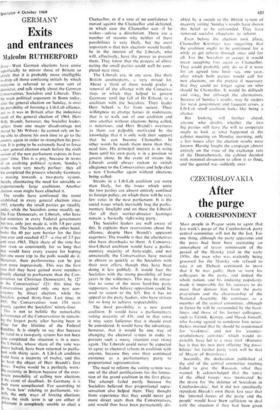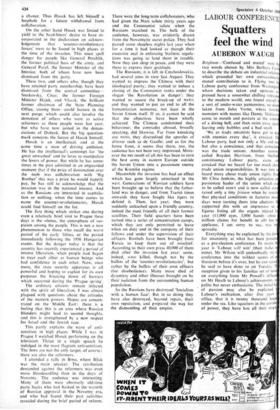CZECHOSLOVAKIA
After the purge
A CORRESPONDENT
Most people in Prague seem to agree that last week's purge of the Czechoslovak party central committee will not be the last. For one thing, although the party apparatus and the press had been busy recreating an atmosphere of terror reminiscent of the period of the Slansky trial in the early 1950s, the man who was evidently being groomed for the Slansky role refused to take it on. Dubcek continued to insist that if he was guilty, then so were his colleagues in the party, and indeed the whole nation. and his enduring popularity made it impossible for his accusers to do more than demote him from the party praesidium and the chairmanship of the National Assembly. He continues as a member of the central committee, although in future he will be surrounded by the hard- liners and those of his former colleagues, such as Cernik, Kcmpy, and Husak himself, who having agreed to condemn him never- theless insisted that he should be condemned for 'weakness', and not for 'counter- revolutionary activities' which would in- evitably have led to a state trial. (Rumour has it that his new post offering 'big possi- bilities' for further party work will be that of Mayor of Bratislava.) Secondly, the declaration published at the end of the central committee meeting failed to give the Russians what they wanted. It acknowledged that the 'entry of the allied troops' was 'motivated' by the desire for 'the defence of Socialism in Czechoslovakia'. but it did not specifically repudiate Husak's own thesis last year that the 'internal forces of the party and the people' would have been sufficient to deal with the situation if they had been given a chance. Thus Husak has left himself a loophole for a future withdrawal from collaboration.
On the other hand Husak was forced to yield to the hard-liners' desire to have in- corporated in the declaration an acknow- ledgement that `counter-revolutionary forces' were to be found in high places at the time of the invasion. This must spell danger for people like General Perchlik, the former political boss of the army, and General Pavel, the former Minister of the Interior, both of whom have now been dismissed from the party.
These two, and others who. though they have retained party membership, have been dismissed from the central committee- Smrkovsk y, Cisar, the former Foreign Minister Hajek, and Vlasak, the brilliant former chairman of the State Planning Office, among them—could feature in the next purge, which could also involve the demotion of others who were as active reformers as these people were last year, but who have now joined in the denun- ciations of Dubcek. But the big question- mark concerns the future of Husak himself.
Husak is an intellectual, and at the same time a man of driving ambition. He has the intellectual's contempt for 'the great unwashed' and he loves to manipulate the levers of power. But while he has some- times in the past admitted in an unguarded moment that if the price of domination over the mob was collaboration with 'Big Brother' this was a price he would happily pay, he has still to acknowledge that the invasion was in the national interest. And as the Russians are interested in capitula- tion or nothing, when the time comes to name the counter-revolutionaries, Husak could find himself on the list.
The first thing which strikes one during even a relatively brief visit to Prague these days is the silence, the atmosphere of sus- picion among the people. This is not a new phenomenon to those who recall the worst period of the early 'fifties, or the period immediately following the 1956 Hungarian events. But the danger today is that the country has recently experienced a period of intense liberation, when people had begun to treat each Other as human beings who had confidence in each other. Now, once more, the state security apparatus is all powerful and hoping to exploit for its own purposes the breaking down of barriers which occurred during the 'Prague spring'.
The ordinary citizens remain infected with the spirit of liberalism. I was almost plagued with questions about the attitudes of the western powers. Hopes are concen- trated on the Middle East: there is a feeling that this is an area where Russian blunders might lead to second thoughts, and this is strengthened by a new respect for Israel and the Jewish race.
This partly explains the wave of anti- semitism in high places. While I was in Prague I watched Husak performing on the television. Thrice in a single speech he indulged in the most flagrant anti-semitism. The Jews are not the only target, of course: there are also the reformers.
I attended a rally in Brno, where Bilak was the main speaker. The retribution demanded against the reformers was even more bloodcurdling than in the days of Novotny. The audience was interesting. Many of them were obviously old-time party hacks who had basked in the warmth of Russian approval in the Novotny era, and who had found their past activities revealed during the brief period of reform.
There were the long-term collaborators, who had given the Nazi salute thirty years ago and the Communist salute when the Russians marched in. The bulk of the audience, however, was evidently drawn from the Novotnyite secret police. They had passed some sleepless nights last year when for a time it had looked as though their excessive zeal in enforcing Stalinist regula- tions was going to land them in trouble. Now they can sleep in peace, and they were there to express their gratitude.
The Russians, it is felt in Czechoslovakia, had several aims in view last August. They wanted to impress the Chinese with their ideological purity; they wanted to induce a closing of the Communist ranks under the slogan 'the Revolution in danger'; they wanted to secure the break-up of NATO; and they wanted to put an end to all the humanitarian nonsense, not least in the Soviet Union itself. If so, it cannot be said that the objectives have been wholly achieved. The Chinese condemned their behaviour; the comrades abroad, broadly speaking, did likewise. Far from knocking out NATO, they discredited the apostles of detente such as de Gaulle; and as for the home front, it seems that there, too, the audience has not been very impressed. More- over the net result of all this has been to turn the best army in eastern Europe outside the Soviet Union into a passionate enemy of the Kremlin regime.
Meanwhile the invasion has had an effect which has gone largely unnoticed in the west. Generations of Russian soldiers have been brought up to believe that the father- land was in danger, and from Tsarist times onwards they have fought like tigers to defend it. Then, last year, they were suddenly unleashed upon a friendly country, indeed the most friendly of all their former satellites. Their field quarters have been turned into a series of concentration camps, which they are only permitted to leave when on duty and in the company of their fellows and under the supervision of their officers. Brothels have been brought from Russia to keep them out of mischief. According to their own press 40,000 of them died after the invasion last year: some, indeed, were killed, though not by the bullets of the 'counter-revolutionaries', but rather by the bullets of their own officers (for disobedience). Many more died of dysentery and other illnesses brought on by their isolation from the surrounding human population.
So the Russians have destroyed 'Socialism with a human face'. But in so doing they have also destroyed, beyond repair, their own reputation, and prepared the way for the dismantling of their empire.



































 Previous page
Previous page